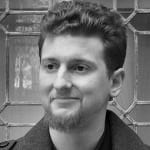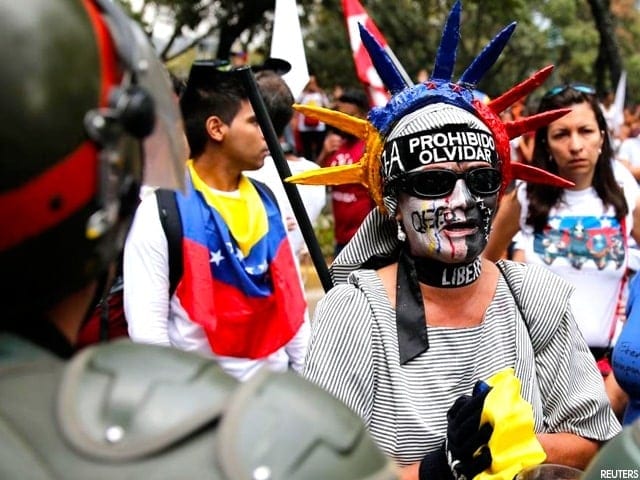Venezuela is Facing Terrorism – SYNA on FOX News / Dakotah Lilly Debates Tucker Carlson
Dakotah Lilly, a leader of Students & Youth for a New America in New York City, defended Venezuela on a national US TV news broadcast. Appearing with Tucker Carlson, on a nightly program with 3 to 4 million viewers across the USA, Lilly called out the FOX news host for his blatant distortions of the harsh situation facing the Bolivarian Socialist Republic.
The class struggle in Venezuela has been in an acute phase for some time. Examine this report by Steve Ellner from 2014. Click on the bar.
Terrorism in Venezuela and Its Accomplices
The private media and important actors both at home and abroad including Washington have downplayed, and in some cases completely ignored, the terrorist actions perpetrated against the Venezuelan government over the past three months. Among the latest examples of terrorism news that have been underreported abroad is the assassination in late April of Eliézer Otaiza, an historic leader of the Chavista movement and the president of the city council of Caracas. Another is a series of reports issued by Interior Secretary Miguel Rodriguez Torres with a wealth of documents – including videos, emails, phone call registries, and phone call recordings – that establish connections between terrorist activity and sectors of the Venezuelan opposition.
An example of how the charges of opposition-promoted terrorism get brushed aside is the opening remarks of Robert Menendez, Chairman of the U.S. Senate Foreign Relations Committee, in hearings to study proposed sanctions against Venezuela. First, Menendez enumerates numerous charges of government human rights violation based on statements by various individuals who are anything but impartial (such as Moisés Naím, who was Planning Minister under the government that Hugo Chávez staged his coup against in 1992). Then Menendez goes on to minimize the seriousness of the widespread violence carried out by the opposition. After recognizing “there has been violence on both sides,” he adds “but we should be perfectly clear that the primary responsibility for the excessive, unjustified use of force rests with the Maduro Administration.”
Anyone who gets their information solely from these sources could easily reach the conclusion that with the exception of a few minor excesses, which are normal and inevitable in protest movements of this sort, what is happening in Venezuela represents a flagrant violation of human rights on the part of the government.
Objectively speaking, the overall picture created by the discourse of political adversaries and the media’s coverage encourages the radical fringe of the opposition that is engaging in violence on an extensive scale. In this sense, those who downplay the importance of the opposition-promoted violence and exaggerate or fabricate actions of security forces to control the protests consciously or unwittingly serve as accomplices of those responsible for destructive activity.
The above statement needs to be accompanied by words of caution. A journalist or political actor certainly has the right to make accusations without being accused of aiding or abetting those belonging to the violent fringe or playing into their hands. The problem, however, is two-fold. In the first place, all analysts agree that cherry picking amounts to distortion of the facts and that the media has the obligation to present all relevant information. To do otherwise is to encourage culprits and blame those who are innocent.
In the second place, accusations made or insinuated by the media and the opposition are often formulated without any proof whatsoever. These statements serve to neutralize any negative reaction to the opposition-promoted violence. In modern-day vernacular, the tactic is called “damage control.” Thus, for instance, the opposition newspaper “Tal Cual” published an article by Sebastián Boccanegra which criticized Chavista spokespeople for alleging that the opposition was behind the assassination of Otaiza (a hypothesis that Interior Minister Rodríguez Torres put forward on the basis of an analysis of the circumstances of his death). Boccanegra then defended the hypothesis that it was the work of delinquents without offering any evidence. Similarly online posts by the opposition completely devoid of evidence attributed Otaiza’s assassination to infighting among Chavista factions.
Similarly, the opposition’s demand for the liberation of student prisoners serves to draw attention away from the violent actions of the protesters. On May 13, the opposition coalition Mesa de la Unidad Democrática (MUD) suspended a much-anticipated “peace dialogue” meeting on grounds that the government had failed to liberate student prisoners. The MUD statement, like those of the opposition in general, lacked any acknowledgment that many of the prisoners, if not most, participated in acts of violence. Obviously the determination as to whether individual prisoners are guilty of unlawful activity corresponds to the courts and not the national executive. The demand for the liberation of the students has become a major slogan of the opposition and street protests.
Recently the Chavista television commentator Miguel Pérez Pirela called on his colleagues to use the word “terrorism” instead of the term “guarimba,” which is a local slang-word referring to foquista-type urban violence.
The list of actions that qualify as terrorist is extensive. One of the most affected sectors has been the metro of Caracas. Metro stations in the eastern part of the city controlled by opposition mayors have been devastated (as well as the one in Parque Carabobo near the city’s center), 90 metro buses have been damaged, and 200 passengers have been injured. On May 13, metro workers marched to the Attorney General’s headquarters (which had also been heavily damaged by opposition protesters several months earlier) to demand a firm government response. The terrorist list also includes the killing of six national guardsmen and three policemen, the complete demolition of the campus of the military school UNEFA in the city of San Cristobal, the destruction of public buildings including the Housing Ministry, the burning of a truck that distributes gas of the state company PDVSA-Gas Comunal in the state of Táchira, as well as vehicles of the state food chain PDVAL, reported cases of attacks on 162 Cuban doctors who work for the state-sponsored Misión Sucre, and the list goes on and on.
The statements coming out of the U.S. Congress and Obama administration condemning human rights violation fail to recognize that sectors of the opposition have been involved in acts of terrorism. It is ironic that the same government that justifies massive indiscriminate surveillance throughout the world and intervenes in numerous nation’s of the Middle East and Africa in the name of anti-terrorism turns a blind eye to terrorist activity in Venezuela and ends up actually encouraging it. The State Department’s revocation of the visa of the president of the National Assembly Diosdado Cabello (on the absurd grounds that he acted as a bag man on behalf of Osama bin Laden) attempts to discredit the very Chavista who represents a hard line in the struggle against terrorism in Venezuela. Terrorism cannot be defined as actions only carried out by one’s enemy. If that is case, the term loses all credibility.
Steve Ellner teaches at the Universidad de Oriente in Puerto La Cruz, Venezuela and is the editor of Latin America’s Radical Left: Challenges and Complexities of Political Power in the Twenty-First Century recently released by Rowman and Littlefield.
 Is an American journalist and political analyst. Tasnim News Agency described him as "a native of Ohio who has campaigned against war and the U.S. financial system." His political activism began while attending Baldwin-Wallace College in Ohio. In 2010, he video recorded a confrontation between Collinwood High School students who walked out to protest teacher layoffs and the police. His video footage resulted in one of the students being acquitted in juvenile court. He was a figure within the Occupy Wall Street protests in New York City. Maupin writes on American foreign policy and other social issues. Maupin is featured as a Distinguished Collaborator with The Greanville Post. READ MORE ABOUT CALEB MAUPIN HERE.
Is an American journalist and political analyst. Tasnim News Agency described him as "a native of Ohio who has campaigned against war and the U.S. financial system." His political activism began while attending Baldwin-Wallace College in Ohio. In 2010, he video recorded a confrontation between Collinwood High School students who walked out to protest teacher layoffs and the police. His video footage resulted in one of the students being acquitted in juvenile court. He was a figure within the Occupy Wall Street protests in New York City. Maupin writes on American foreign policy and other social issues. Maupin is featured as a Distinguished Collaborator with The Greanville Post. READ MORE ABOUT CALEB MAUPIN HERE.
 The hostile host did his best to insult him, but Lilly stood strong, and calmly stated the reality of the situation. Carlson became somewhat flustered, as the 19-year-old student rattled off facts about the Carter Center and the legitimacy of the Venezuelan elections, countering Tucker’s broad generalizations and deceptions.
The hostile host did his best to insult him, but Lilly stood strong, and calmly stated the reality of the situation. Carlson became somewhat flustered, as the 19-year-old student rattled off facts about the Carter Center and the legitimacy of the Venezuelan elections, countering Tucker’s broad generalizations and deceptions.




